Charles E W Bean, Diaries, AWM38 3DRL 606/268/1 - 1917 - 1936 - Part 7
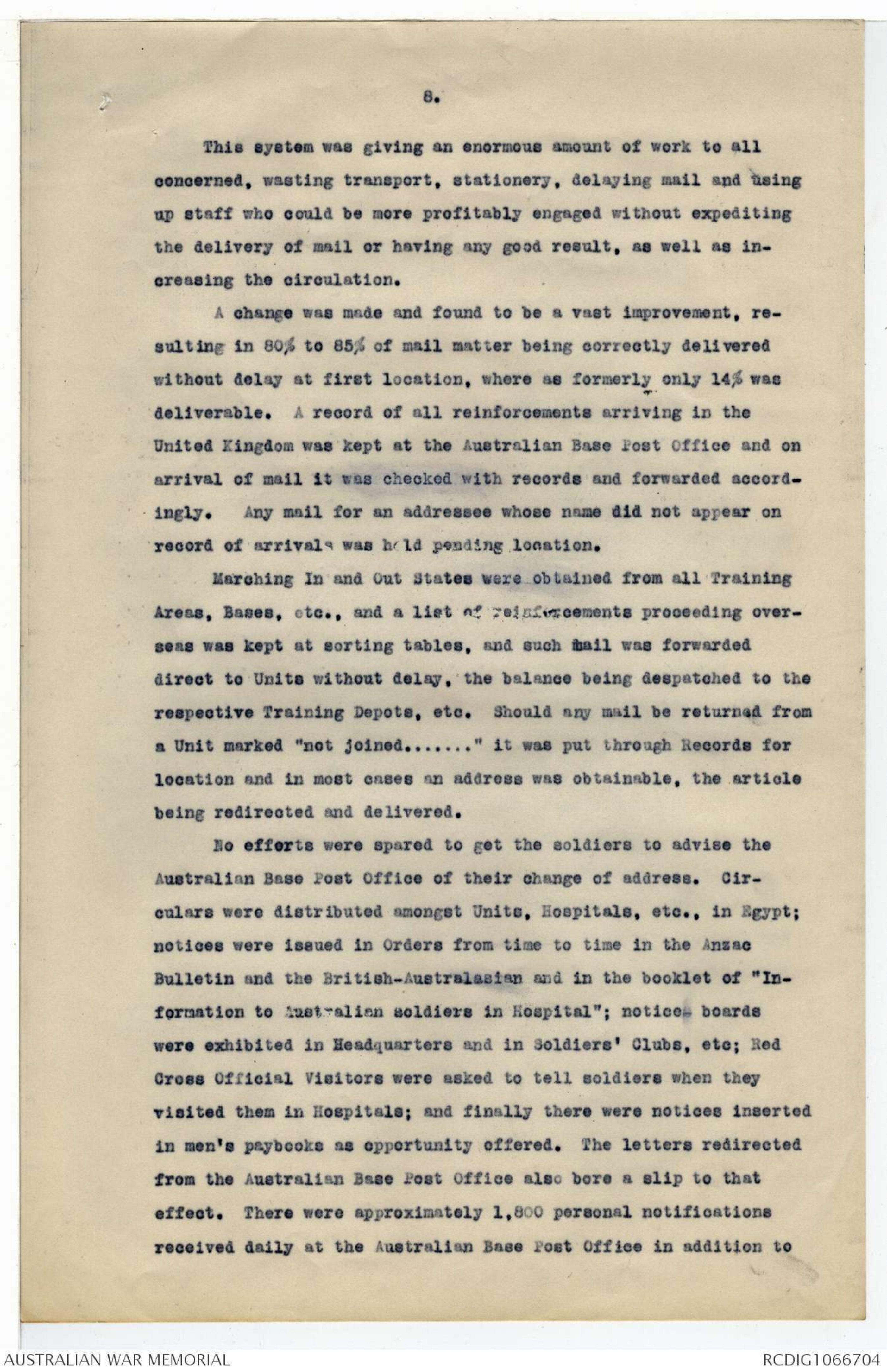
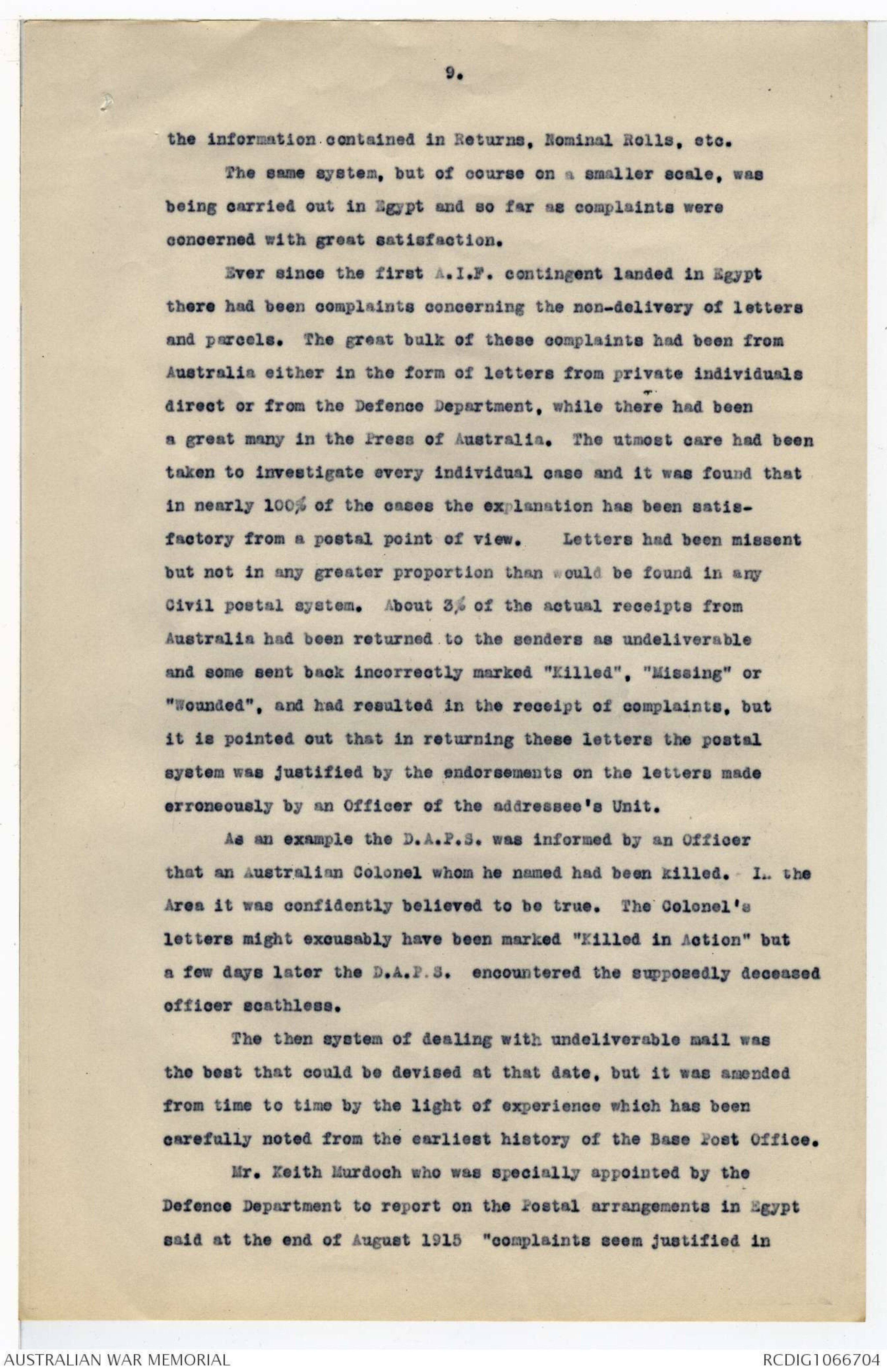
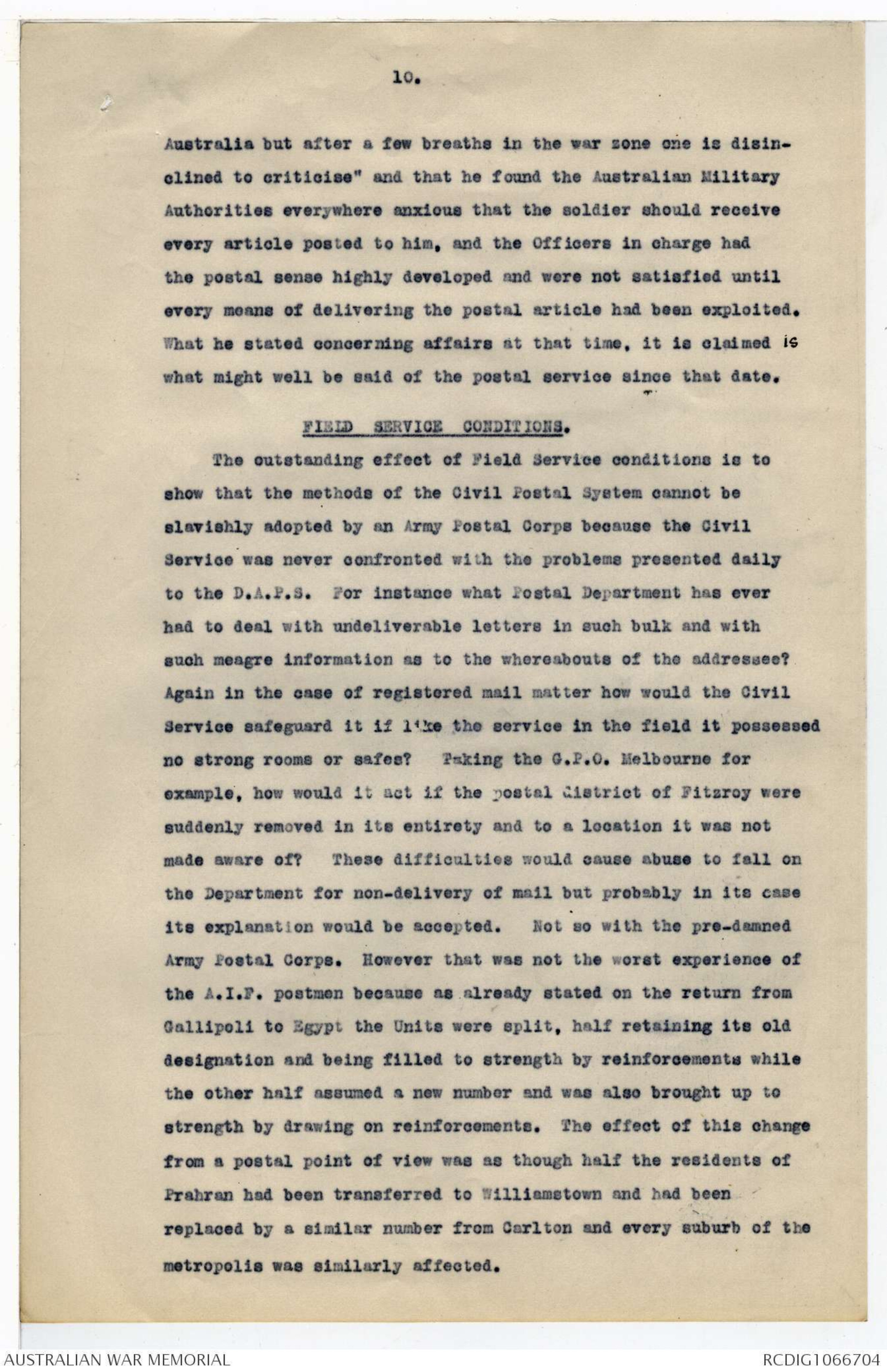
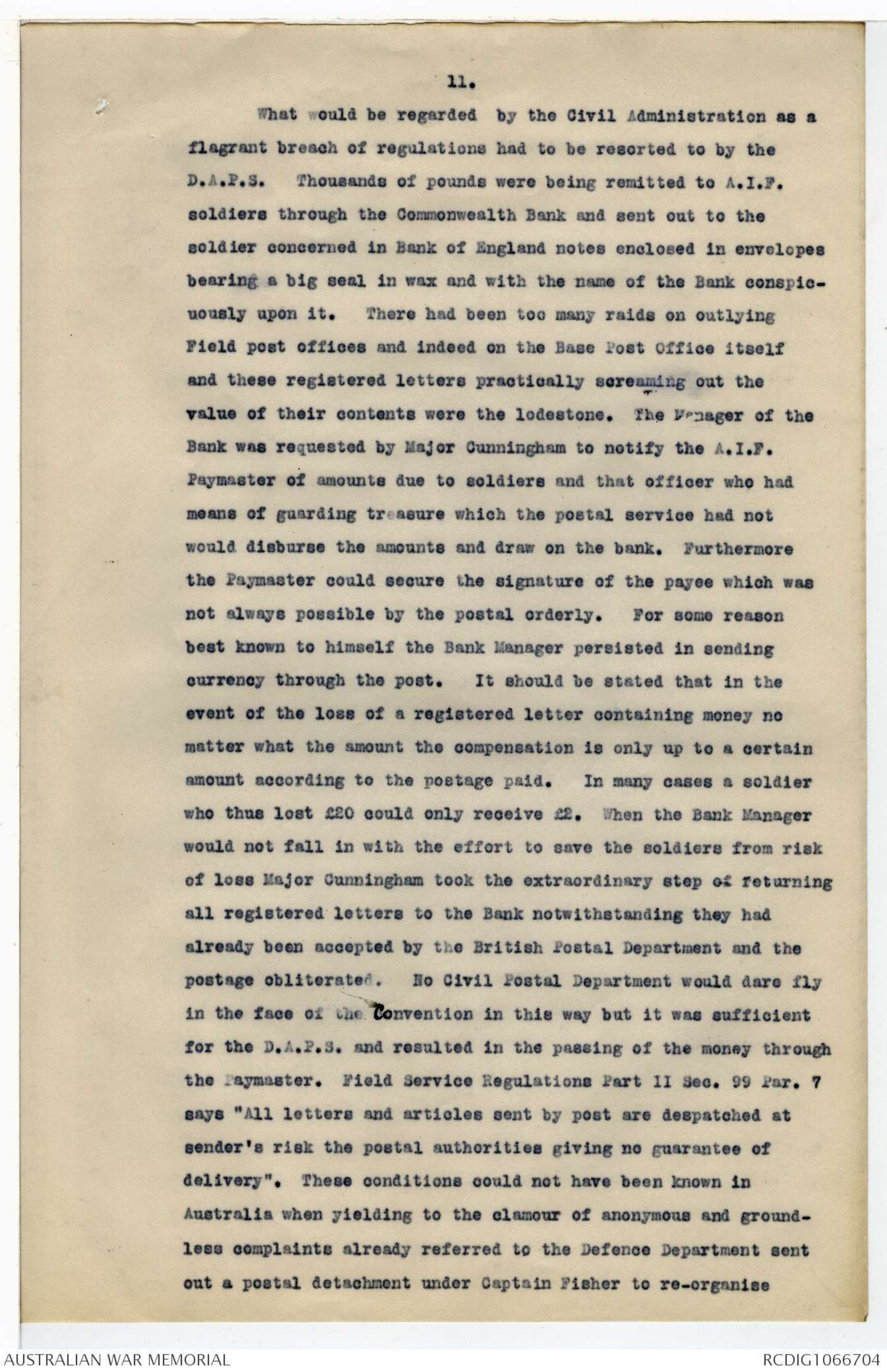
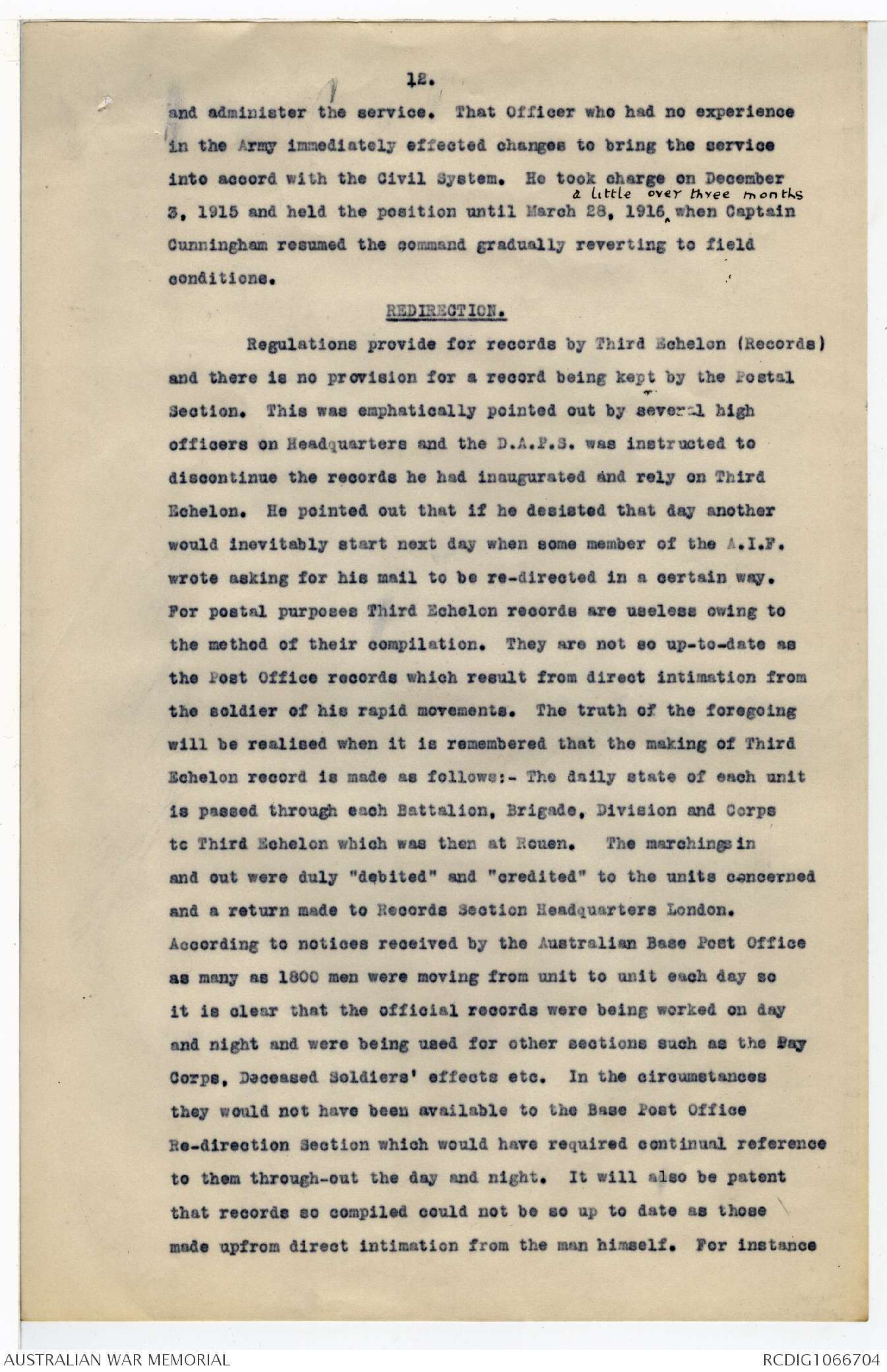
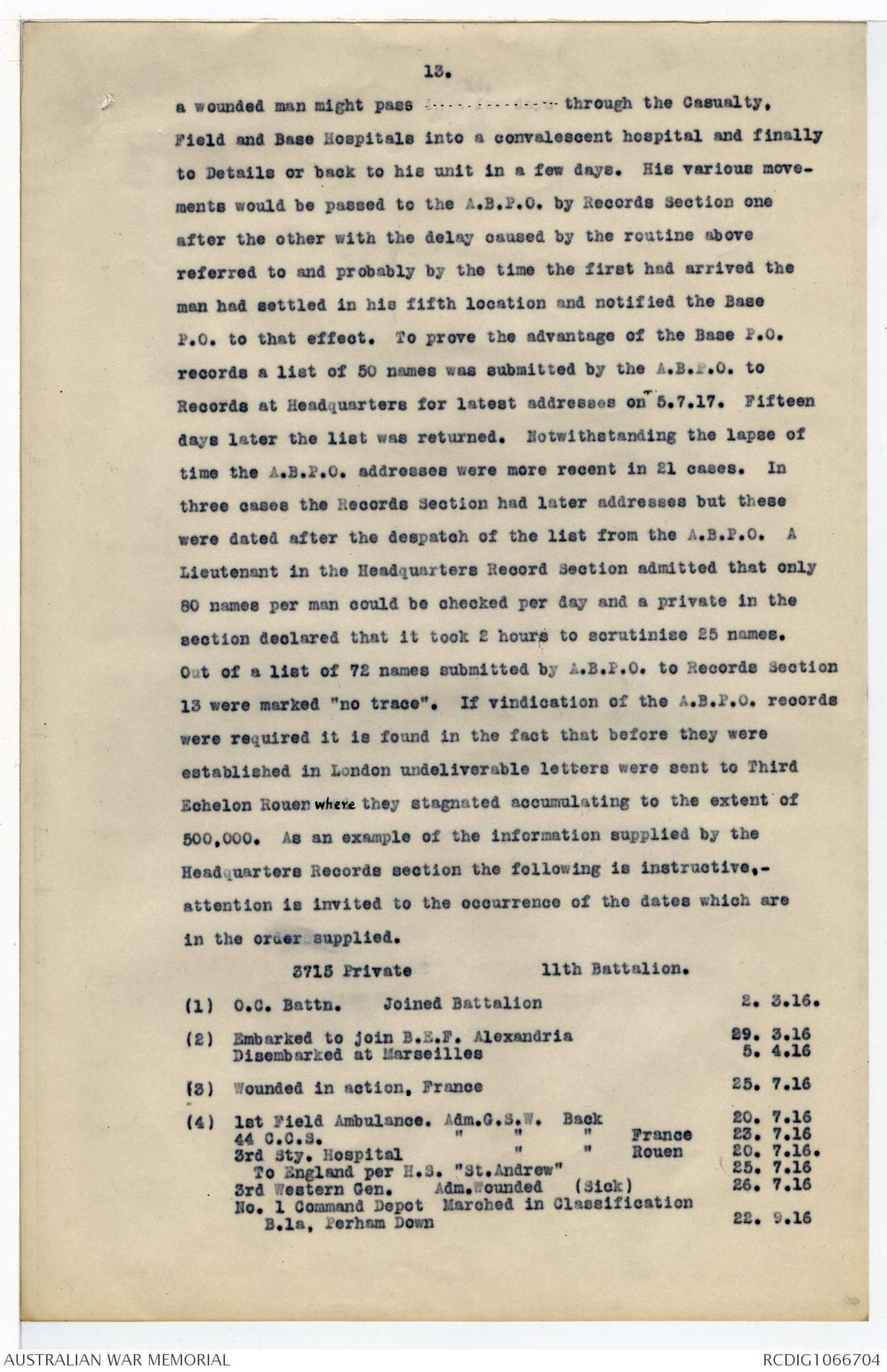
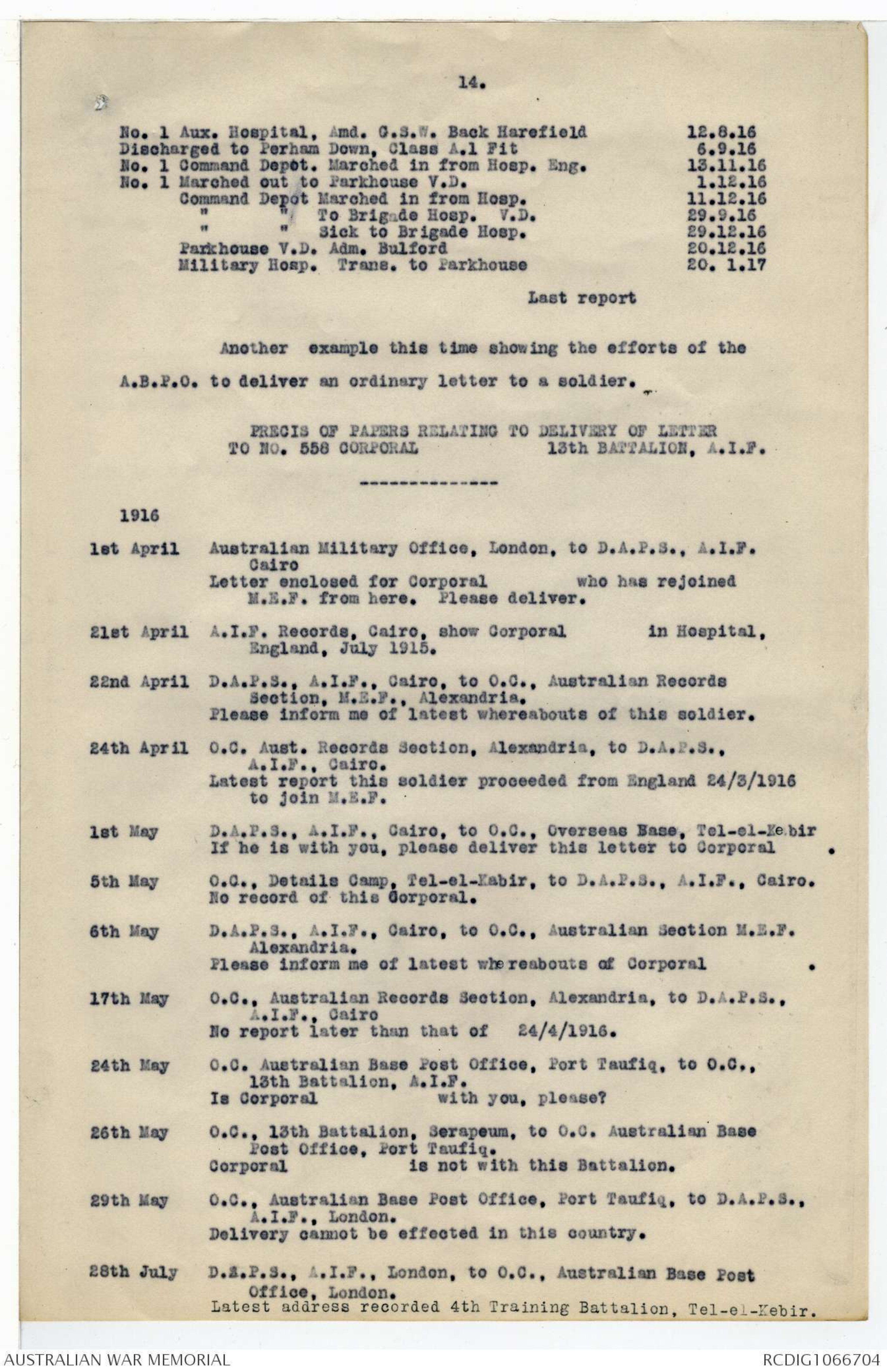
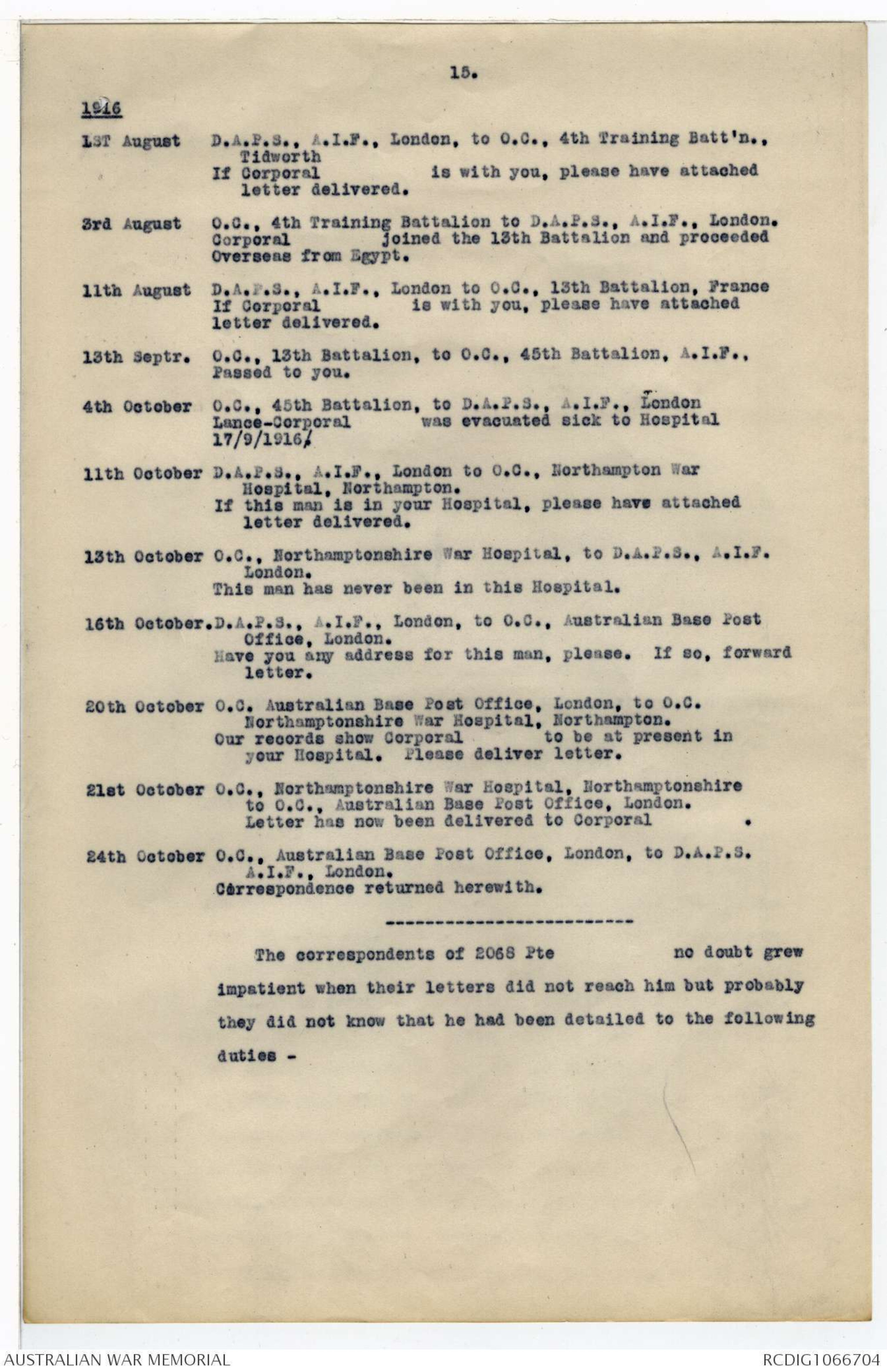
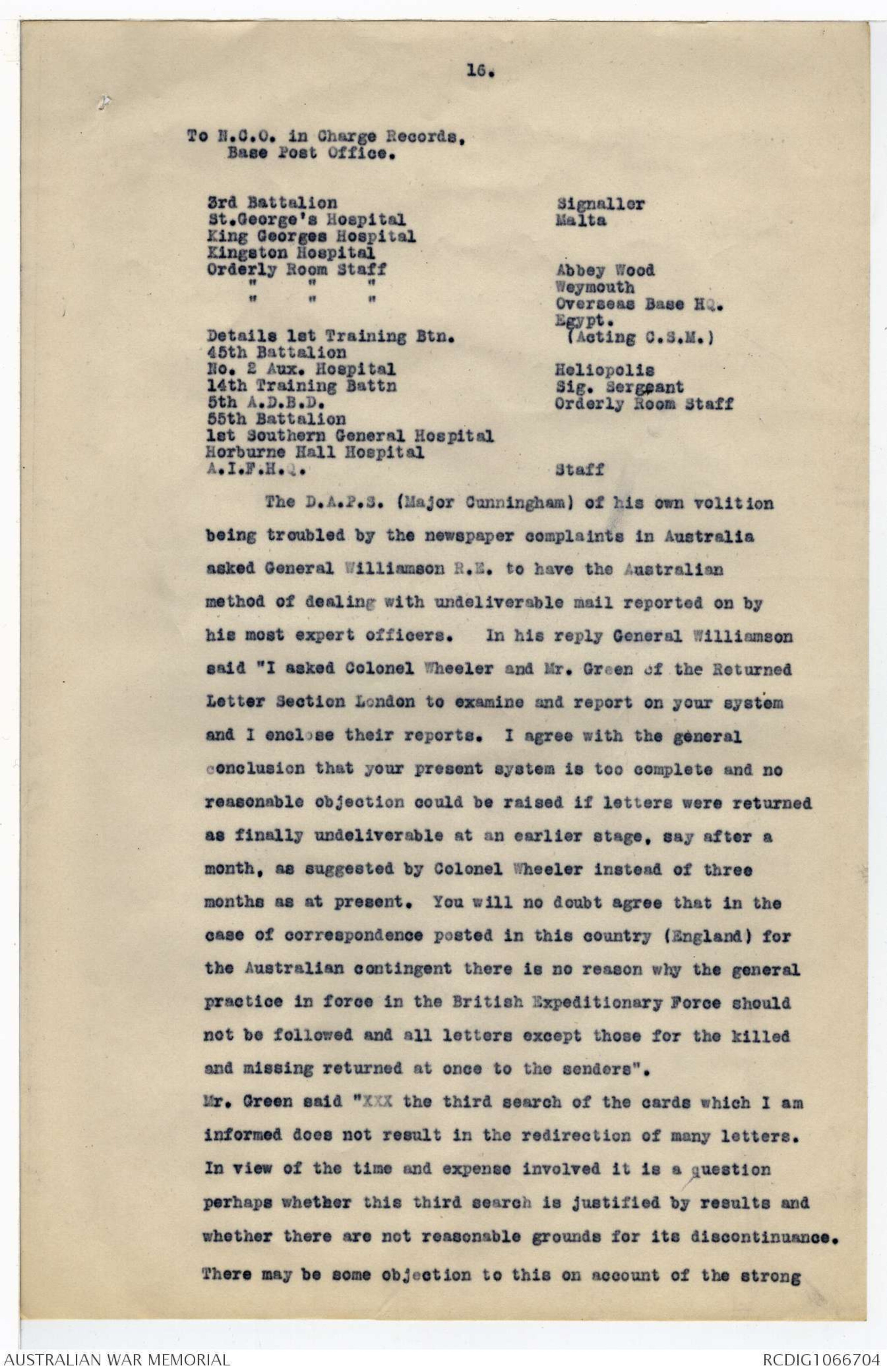
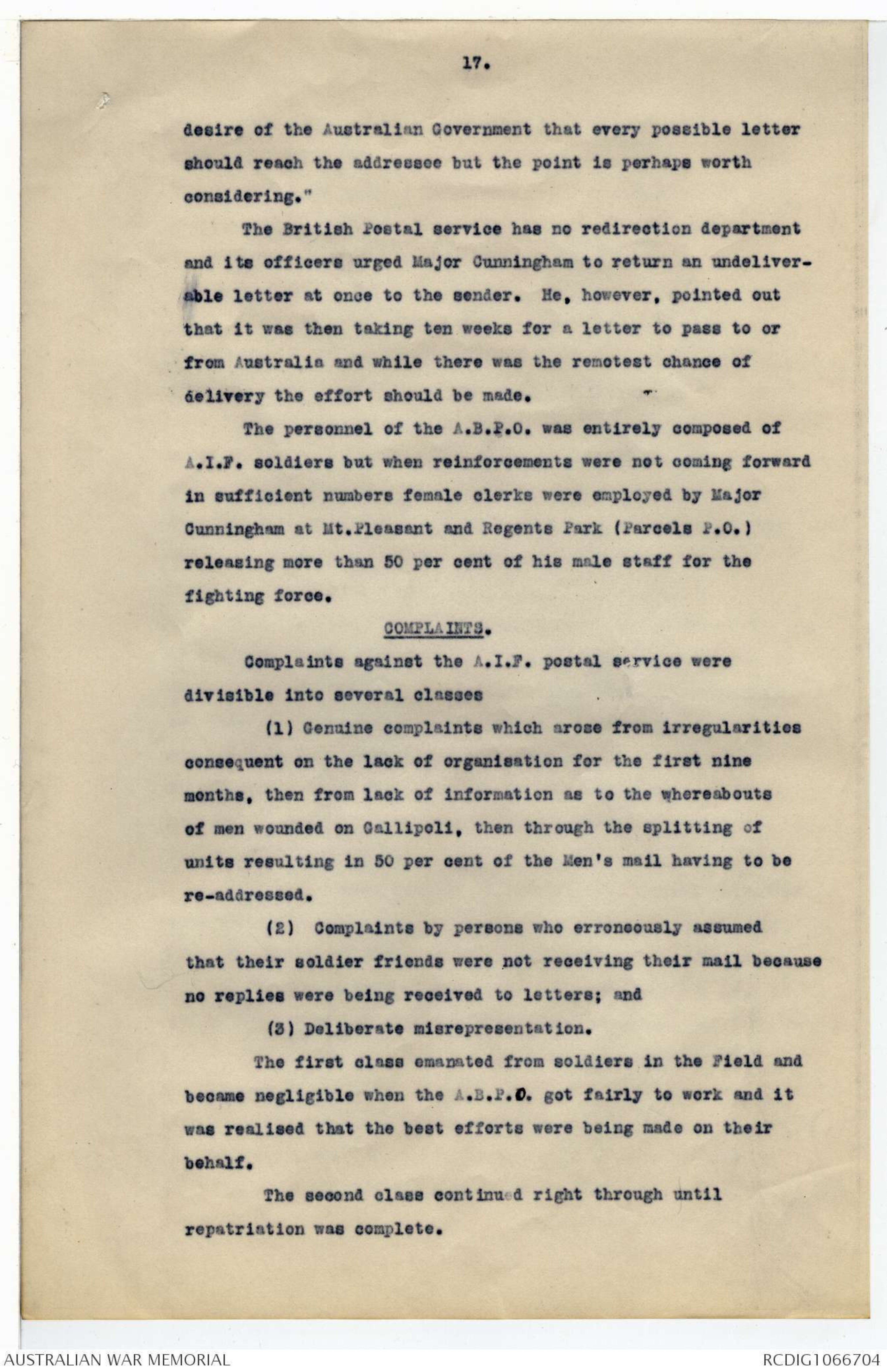
8
This system was giving an enormous amount of work to all
concerned, wasting transport, stationery, delaying mail and using
up staíf who could be more profitably engaged without expediting
the delivery of mail or having any good result, as well as
increasing the circulation.
A change was made and found to be a vast improvement,
resulting in 80% to 85% of mail matter being correctly delivered
without delay at first location, where as formerly only 14% was
deliverable. A record of all reinforcements arriving in the
United Kingdom was kept at the Australian Base Post Office and on
arrival of mail it was checked with records and forwarded accordingly.
Any mail for an addressee whose name did not appear on
record of arrivals was held pending losation.
Marching In and Out States were obtained from all Training
Areas, Bases, etc., and a list of reinforcements proceeding overseas
was kept at sorting tables, and such mail was forwarded
direct to Units without delay, the balance being despatched to the
respective Training Depots, etc. Should any mail be returned from
a Unit marked "not joined......." it was put through Records for
location and in most cases an addross was obtainable, the article
being redirected and delivered.
No efforts were spared to get the soldiers to advise the
Australian Base Post Office of their change of address.
Circulars were distributed amongst Units, Hospitals, etc., in Egypt;
notices were issued in Orders from time to time in the Anzac
Bulletin and the British-Australasian and in the booklet of "In-
formation to Australien soldiers in Hospital"; notices boards
were exhibited in Headquarters and in Soldiers' Clubs, etc; Red
Cross Official Visitors were asked to tell soldiers when they
visited them in Hospitals; and finally there were notices inserted
in men's paybooks as opportunity offered. The letters redirected
from the Australian Base Post Office also bore a slip to that
effect. There were approximately 1,800 personal notifications
received daily at the Australian Base Post Office in addition to
9
the information contained in Returns, Nominal Rolls, etc.
The same system, but of course on a smaller scale, was
being carried out in Egypt and so far as complaints were
concerned with great satisfaction.
Ever since the first A.I.F. contingent landed in Egypt
there had been complaints concerning the non-delivery of letters
and parcels. The great bulk of these complaints had been from
Australia either in the form of letters from private individuals
direct or from the Defence Department, while there had been
a great many in the Press of Australia. The utmost care had been
taken to investigate every individual case and it was found that
in nearly l00% of the cases the explanation has been satisfactory
from a postal point of view. Letters had been missent
but not in any greater proportion than would be found in any
Civil postal system. About 35 of the actual receipts from
Australia had been returned to the senders as undeliverable
and some sent back incorrectly marked "Killed", "Missing" or
"Wounded", and had resulted in the receipt of complaints, but
it is pointed out that in returning these letters the postal
system was justified by the endorsements on the letters made
erroneously by an Officer of the addressee's Unit.
As an example the D.A.P.S. was informed by an Officer
that an Australian Colonel whom he named had been killed. In the
Area it was confidently believed to be true. The Colonel's
letters might excusably have been marked "Killed in Action" but
a few days later the D.A.P.S. encountered the supposedly deceased
officer scathless.
The then system of dealing with undeliverable mail was
the best that could be devised at that date, but it was amended
from time to time by the light of experience which has been
carefully noted from the earliest history of the Base Post Office.
Mr. Keith Murdoch who was specially appointed by the
Defence Department to report on the Postal arrangements in Egypt
said at the end of August 1915 "complaints seem justified in
10
Australia but after a few breaths in the war zone one is disinclined to criticise" and that he found the Australian Military
Authorities everywhere anxious that the soldier should receive
every article posted to him, and the Officers in charge had
the postal sense highly developed and were not satisfied until
every means of delivering the postal article had been exploited.
What he stated concerning affairs at that time, it is claimed is
what might well be said of the postal service since that date.
FIELD SERVICE CONDITIONS.
The outstanding effect of Field Service concitions is to
show that the methods of the Civil Postal System cannot be
slavishly adopted by an Army Postal Corps because the Civil
Service was never confronted with the problems presented daily
to the D.A.P.S. For instance what Postal Department has ever
had to deal with undeliverable letters in such bulk and with
such meagre information as to the whereabouts of the addressee?
Again in the case of registered mail matter how would the Civil
Service safeguard it if like the service in the field it possessed
no strong rooms or safes? Taking the G.P.O. Melbourne for
example, how would it act if the postal district of Fitzroy were
suddenly removed in its entirety and to a location it was not
made aware of? These difficulties would cause abuse to fall on
the Department for non-delivery of mail but probably in its case
its explanation would be accepted. Not so with the pre-damned
Army Postal Corps. However that was not the worst experience of
the A.I.F. postmen because as already stated on the return from
Gallipoli to Egypt the Units were split, half retaining its old
designation and being filled to strength by reinforcements while
the other half assumed a new number and was also brought up to
strength by drawing on reinforcements. The effect of this change
from a postal point of view was as though half the residents of
Prahran had been transferred to Williamstown and had been
replaced by a similar number from Carlton and every suburb of the
metropolis was similarly affected.
11
What would be regarded by the Civil Administration as a
flagrant breach of regulations had to be resorted to by the
D.A.P.S. Thousands of pounds were being remitted to A.I.F.
soldiers through the Commonwealth Bank and sent out to the
soldier concerned in Bank of England notes enclosed in envelopes
bearing a big seal in wax and with the name of the Bank conspicuously
upon it. There had been too many raids on outlying
Field post offices and indeed on the Base Post Office itself
and these registered letters practically screaming out the
value of their contents were the lodestone. The Manager of the
Bank was requested by Major Cunningham to notify the A.I.F.
Paymaster of amounts due to soldiers and that officer who had
means of guarding treasure which the postal service had not
would disburse the amounts and draw on the bank. Furthermore
the Paymaster could secure the signature of the payee which was
not always possible by the postal orderly. For some reason
best known to himself the Bank Manager persisted in sending
currency through the post. It should be stated that in the
event of the loss of a registered letter containing money no
matter what the amount the compensation is only up to a certain
amount according to the postage paid. In many cases a soldier
who thus lost £20 could only receive £2. When the Bank Manager
would not fall in with the effort to save the soldiers from risk
of loss Major Cunningham took the extraordinary step ot returning
all registered letters to the Bank notwithstanding they had
already been accepted by the British Postal Department and the
postage obliterated. No Civil Postal Department would dare fly
in the face of the Convention in this way but it was sufficient
for the D.A.P.S. and resulted in the passing of the money through
the Paymaster. Field Service Regulations Part II Sec. 99 Par. 7
says "All letters and articles sent by post are despatched at
sender's risk the postal authorities giving no guarantee of
delivery". These conditions could not have been known in
Australia when yielding to the clamour of anonymous and groundless
complaints already referred to the Defence Department sent
out a postal detachment under Captain Fisher to re-organise
12
and administer the service. That Officer who had no experience
in the Army immediately effected changes to bring the service
into acoord with the Civil System. He took charge on December
3, 1915 and held the position until March 28, 1916, ^ a little over three months when Captain
Cunningham resumed the command gradually reverting to field
conditions.
REDIRECTION.
Regulations provide for records by Third Echelon (Records)
and there is no provision for a record being kept by the Postal
Section. This was emphatically pointed out by several high
officers on Headquarters and the D.A.P.S. was instructed to
discontinue the records he had inaugurated and rely on Third
Echelon. He pointed out that if he desisted that day another
would inevitably start next day when some member of the A.I.F.
wrote asking for his mail to be re-directed in a certain way.
For postal purposes Third Echelon records are useless owing to
the method of their compilation. They are not so up-to-date as
the Post Office records which result from direct intimation from
the soldier of his rapid movements. The truth of the foregoing
will be realised when it is remembered that the making of Third
Echelon record is made as follows:- The daily state of each unit
is passed through each Battalion, Brigade. Division and Corps
to Third Echelon which was then at Rouen. The marchings in
and out were duly "debited" and "credited" to the units concerned
and a return made to Records Section Headquarters London.
According to notices received by the Australian Base Post Office
as many as 1800 men were moving from unit to unit ecch day so
it is clear that the official records were being werked on day
and night and were being used for other sections such as the Pay
Corps, Deceased Soldiers' effects etc. In the circumstances
they would not have been available to the Base Post Office
Re-direction Section which would have required continual reference
to them through-out the day and night. It will also be patent
that records so compiled could not be so up to date as those
made upfrom direct intimation from the man himself. For instance
13
a wounded man might pass ..... through the Casualty,
Field and Base Hospitals into a convalescent hospital and finally
to Details or back to his unit in a few days. His various movements
would be passed to the A.B.P.O. by Records Section one
after the other with the delay caused by the routine above
referred to and probably by the time the first had arrived the
man had settled in his fifth location and notified the Base
P.O. to that effect. To prove the advantage of the Base P.O.
records a list of 50 names was submitted by the A.B.P.O. to
Records at Headquarters for latest addresses on 5.7.17. Fifteen
days later the list was returned. Notwithstanding the lapse of
time the A.B.P.O. addresses were more recent in 21 cases. In
three cases the Records Section had later addresses but these
were dated after the despatch of the list from the A.B.P.O. A
Lieutenant in the Headquarters Record Section admitted that only
80 names per man could be checked per day and a private in the
section deolared that it took 2 hours to scrutinise 25 names.
Out of a list of 72 names submitted by A.B.P.O. to Records Section
13 were marked "no trace". If vindication of the A.B.P.O. records
were required it is found in the fact that before they were
established in London undeliverable letters were sent to Third
Echelon Rouen where they stagnated accumulating to the extent of
500.000. As an example of the information supplied by the
Headquarters Records section the following is instructive, -
attention is invited to the occurrence of the dates which are
in the order supplied.
| 3715 Private | 11th Battalion. |
|
|
| (1) | O.C. Battn. Joined Battalion |
2.3.16 |
|
| (2) |
Embarked to join B.E.F. Alexandria Disembarked at Marseilles |
29.3.16 5.4.16 |
|
| (3) | Wounded in action, France |
25.7.16 |
|
| (4) | 1st Field Ambulance, Adm.G.S.W. Back | 20.7.16 | |
| 44 C.C.S " " " France | 23.7.16 | ||
| 3rd Sty Hospital " " Rouen | 20.7.16 | ||
| To England per H.S. "St. Andrew" | 25.7.16 | ||
| 3rd Western Gn. Adm. Wounded (Sick) | 26.7.16 | ||
| No.1 Command Depot March in Classification B.1s, Perham Down |
22.9.16 | ||
14
| No. 1 Aux. Hospital, Amd. C.S.W. Back Harefield | 12.8.16 | |
| Discharged to Perham Down, Class A.1 Fit | 6.9.16 | |
| No. 1 Command Depot. Marched in from Hosp. Eng. | 13.11.16 | |
| No. 1 Marched out to Parkhouse V.D. | 1.12.16 | |
| Command Depot Marched in from Hosp. | 11.12.16 | |
| " " Sick to Brigade Hosp. V.D. | 29.9.16 | |
| " " Sick to Brigade Hosp. | 29.12.16 | |
| Parkhouse V.D. Adm. Bulford | 20.12.16 | |
| Military Hosp. Trans. to Parkhouse | 20.1.17 | |
|
Last report |
Another example this time showing the efforts of the
A.B.P.O. to deliver an ordinary letter to a soldier.
PRECIS OF PAPERS RELATING TO DELIVERY OF LETTER
TO NO. 558 CORPORAL 13th BATTALION, A.I.F.
1916
lst April Australian Military Office, London, to D.A.P.S., A.I.F.
Cairo
Letter enclosed for Corporal who has rejoined
M.E.F. from here. Please deliver.
21st April A.I.F. Records, Cairo, show Corporal in Hospital,
England, July 1915.
22nd April D.A.P.S., A.I.F., Cairo, to O.C., Australian Records
Section, M.E.F., Alexandria.
Please inform me of latest whereabouts of this soldier.
24th April O.C. Aust. Records Section, Alexandria, to D.A.P.S.,
A.I.F., Cairo.
Latest report this soldier proceeded from England 24/3/1916
to join M.E.F.
1st May D.A.P.S., A.I.F., Cairo, to O.C., Overseas Base, Tel-el-Kebir
If he is with you, please deliver this letter to Corporal
5th May O.C., Details Camp, Tel-el-Kabir, to D.A.P.S., A.I.F., Cairo.
No record of this Corporal.
6th May D.A.P.S., A.I.F., Cairo, to O.C., Australian Section M.E.F.
Alexandria.
Please inform me of latest whereabouts of Corporal
17th May O.C.. Australian Records Section, Alexandria, to D.A.P.S..
A.I.F., Cairo
No report later than that of 24/4/1916.
24th May O.C. Australian Base Post Office, Port Taufiq, to O.C.,
13th Battalion, A.I.F.
Is Corporal with you, pease?
26th May O.C., 13th Battalion, Serapeum, to O.C. Australian Base
Post Office, Port Taufiq.
Corporal is not with this Battalion.
29th May O.C.. Australian Base Post Office, Port Taufig, to D.A.P.S.,
A.I.F., London.
Delivery cannot be effected in this country.
28th July D.A.P.S., A.I.F., London, to O.C., Australian Base Post
Office, London.
Latest address recorded 4th Training Battalion, Tel-el-Kebir.
15
1916
1st August D.A.P.S., A.I.F., London, to O.C., 4th Training Batt'n.,
Tidworth
If Corporal is with you, please have attached
letter delivered.
3rd August O.C., 4th Training Battalion to D.A.P.S., A.I.F., London.
Corporal joined the 13th Battalion and proceeded
Overseas from Egypt.
11th August D.A.P.S., A.I.F., London to O.C., 13th Battalion, France
If Corporal is with you, please have attached
letter delivered.
13th Septr. O.C., 13th Battalion, to O.C., 45th Battalion, A.I.F..
Passed to you.
4th October O.C., 45th Battalion, to D.A.P.S., A.I.F., London
Lance-Corporal was evacuated sick to Hospital
17/9/1916.
11th October D.A.P.S., A.I.F., London to O.C., Northampton War
Hospital, Northampton.
If this man is in your Hospital, please have attached
letter delivered.
13th October O.C.. Northamptonshire War Hospital, to D.A.P.S., A.I.F. London.
This man has never been in this Hospital.
l6th October. D.A.P.S., A.I.F., London, to O.C., Australian Base Post
Office, London.
Have you any address for this man, please. If so, forward
letter.
20th October O.C. Australian Base Post Office, London, to O.C.
Northamptonshire War Hospital, Northampton.
Our records show Corporal to be at present in
your Hospital. Please deliver letter.
21st October O.C., Northamptonshire War Hospital, Northamptonshire
to O.C., Australian Base Post Office, London.
Letter has now been delivered to Corporal
24th October O.C., Australian Base Post Offico, London, to D.A.P.S.
A.I.F., London.
Correspondence returned herewith.
The correspondents of 2068 Pte no doubt grew
impatient when their letters did not reach him but probably
they did not know that he had been detailed to the following
duties -
16.
To N.C.O. in Charge Records,
Base Post Office.
3rd Battalion Signaller
St.George's Hospital Malta
King Georges Hospital
Kingston Hospital
Orderly Room staff Abbey Wood
" " " Weymouth
" " " Overseas Base HQ. Egypt.
Details lst Training Btn. (Acting C.S.M.)
45th Battalion
No. 2 Aux. Hospital Heliopolis
14th Training Battn Sig. Sergeant
5th A.D.B.D. Orderly Room Staff
55th Battalion
1st Southern Ceneral Hospital
Horburne Hall Hospital
A.I.F.H.Q. Staff
The D.A.P.S. (Major Cunningham) of his own volition
being troubled by the newspaper complaints in Australia
asked Ceneral Williamson R.E. to have the Australian
method of dealing with undeliverable mail reported on by
his most expert officers. In his reply Ceneral Williamson
said "I asked Colonel Wheeler and Mr. Green ef the Returned
Letter Section London to examine and report on your system
and I enclose their reports. I agree with the general
conclusion that your present system is too complete and no
reasonable objection could be raised if letters were returned
as finally undeliverable at an earlier stage, say after a
month, as suggested by Colonel Wheeler instead of three
months as at present. You will no doubt agree that in the
case of correspondence posted in this country (England) for
the Australian contingent there is no reason why the general
practice in force in the British Expeditionary Force should
not be followed and all letters except those for the killed
and missing returned at once to the sendrrs".
Mr. Green said "XXX the third search of the cards which I am
informed does not result in the redirection of many letters.
In view of the time and expense involved it is a question
perhaps whether this third search is justified by results and
whether there are not reasonable grounds for its discontinuance.
There may be some objection to this on account of the strong
17
desire of the Australian Government that every possible letter
should reach the addressee but the point is perhaps worth
considering."
The British Postal service has no redirection department
and its officers urged Major Cunningham to return an undeliverable
letter at once to the sender. He, however, pointed out
that it was then taking ten weeks for a letter to pass to or
from Australia and while there was the remotest chance of
delivery the effort should be made.
The personnel of the A.B.P.O. was entirely composed of
A.I.F. soldiers but when reinforcements were not coming forward
in sufficient numbers female clerks were employed by Major
Cunningham at Mt. Pleasant and Regents Park (Parcels P.O.)
releasing more than 50 per cent of his male staff for the
fighting force.
COMPLAINTS.
Complaints against the A.I.F. postal service were
divisible into several classes
(1) Genuine complaints which arose from irregularities
consequent on the lack of organisation for the first nine
months, then from lack of information as to the whereabouts
of men wounded on Gallipoli, then through the splitting of
units resulting in 50 per cent of the Men's mail having to be
re-addressed.
(2) Complaints by persons who erroneously assumed
that their soldier friends were not receiving their mail because
no replies were being received to letters; and
(3) Deliberate misrepresentation.
The first class emanated from soldiers in the Field and
became negligible when the A.B.P.O. got fairly to work and it
was realised that the best efforts were being made on their
behalf.
The second class continued right through until
repatriation was complete.
 Sam scott
Sam scottThis transcription item is now locked to you for editing. To release the lock either Save your changes or Cancel.
This lock will be automatically released after 60 minutes of inactivity.